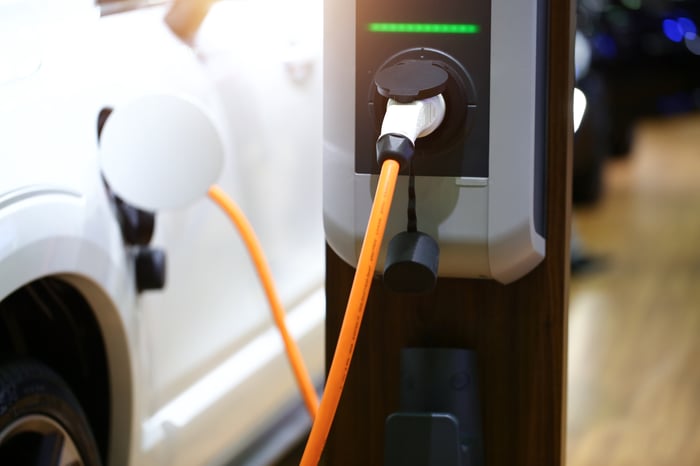Over the past six decades, Berkshire Hathaway (BRK.A -0.28%) (BRK.B -0.68%) CEO Warren Buffett has demonstrated that he knows a thing or two about investing. Since taking Berkshire's reins in 1965, he's created more than $680 billion in shareholder value and generated an average annual return -- I repeat, average annual return -- of 20.1% for his company's stock. In aggregate, investors of the company's Class A shares (BRK.A) have gained more than 3,600,000%.
While there are a number of reasons for Buffett's ongoing success, such as portfolio concentration and his love of dividend stocks, arguably the biggest key to the Oracle of Omaha's outperformance is his willingness to hold investments for long periods.
In particular, patience has been key with four Warren Buffett stocks, all of which have shockingly low cost bases, relative to where they're trading now.

Patience has been a virtue (and moneymaker) for Berkshire Hathaway CEO Warren Buffett. Image source: The Motley Fool.
Coca-Cola: Cost basis of $3.25 per share
One of the more eye-popping cost bases in Berkshire Hathaway's portfolio is for its longest-tenured stock, beverage giant Coca-Cola (KO 1.50%). Warren Buffett's annual letter to shareholders notes a $1.299 billion cost basis and 400 million shares owned. That works out to an average cost of $3.2475 per share, which I've rounded up for simplicity's sake. Shares of Coke closed at $65.72 last week.
Aside from sitting on a 1,924% unrealized gain in Coca-Cola's share price, Berkshire Hathaway is also benefiting big-time from Coke's steady dividend. Over the next 12 months, Coca-Cola's base annual payout should be $1.76 per share. Relative to Buffett's cost basis, we're talking about a 54% annual yield! Berkshire Hathaway is effectively more than doubling its initial investment in Coca-Cola from the dividend payment alone every two years.
Perhaps the best aspect of Coca-Cola is the company's geographic diversity. With the exception of Cuba, North Korea, and Russia (in response to Russia invading Ukraine), the company is operating in every other country worldwide. This means it's able to take advantage of the highly predictable cash flow of developed markets, as well as boost its organic growth rate via emerging markets.
As I've previously pointed out, Coke's marketing team is top-notch as well. Few companies are able to cross generational gaps so easily and connect with users.

Image source: Getty Images.
Moody's: Cost basis of $10.05 per share
If you think Berkshire Hathaway's unrealized gain on Coca-Cola is impressive, take a closer look at how high ratings agency Moody's (MCO -0.25%) has flown. According to Buffett's shareholder letter, Berkshire owned 24,669,778 shares at a cost basis of $248 million. This works out to a cost of $10.05 per share. With Moody's stock ending last week at $288.96, Buffett and his team are sitting on a 2,774% unrealized gain.
Similar to Coke, Buffett's company is also generating a mountain of passive income from Moody's. Despite a current yield that doesn't quite reach the 1% threshold (0.97%, as of May 13), the company's base annual payout of $2.80 works out to a yield of cost of almost 28%!
Moody's has been a huge beneficiary of the historically low interest-rate environment. Low rates encouraged companies to issue debt in order to hire, acquire, and innovate. The more debt that was issued, the busier Moody's debt-rating division was kept.
However, with interest rates beginning to climb, Moody's analytics segment appears set to become its superstar. This is the division that helps businesses navigate credit risk and regulatory compliance, among other tasks. Given the heightened risk of a domestic and/or global economic slowdown, Moody's analytics segment should continue to grow at a healthy pace.

Image source: Getty Images.
BYD Corp.: Cost basis of $1.03 per share
To continue this game of one-upmanship, China-based electric vehicle (EV) manufacturer BYD Corp. (BYDD.F 2.05%) might have the most shocking cost basis and unrealized return of any Buffett holding. Based on the 225 million shares held and $232 million cost basis, the average cost per share is about $1.03. With shares of BYD ending the previous week at $30.31, Buffett's company is riding an unrealized gain of 2,840%.
On one hand, EV stocks appear to check all the appropriate boxes as no-brainer investments. Most of the world's largest economies are actively combating carbon emissions and climate change with green-energy initiatives. Promoting the use of EVs is one of the many ways countries can meet their lower emission targets.
China also happens to be the largest auto market in the world, which makes BYD's opportunity that much grander. According to estimates from the China Society of Automotive Engineers, half of all new vehicle sales in the country are expected to be powered by alternative energy by 2035 (about 95% of those being EVs).
On the other hand, ramping up the EV landscape will come with speed bumps. For example, the COVID-19 pandemic has adversely impacted semiconductor chip supply. Additionally, labor and material costs are skyrocketing at a time when global growth looks to be weakening. Despite whatever near-term turbulence may arise, don't expect the Oracle of Omaha to hit the brakes on this investment.

Image source: American Express.
American Express: Cost basis of $8.49 per share
Finally, Warren Buffett's cost basis is jaw-droppingly low on credit services company American Express (AXP 0.07%). At the beginning of 2022, Berkshire Hathaway owned 151,610,700 shares of AmEx at a cost basis of $1.287 billion. That works out to $8.489 per share, which I've rounded up to $8.49. American Express ended last week at $158.75, which represents an unrealized increase of around 1,770%.
Trailing only Coca-Cola and Wells Fargo, American Express has been a continuous holding for Buffett's company since 1993. And as with many of its longtime holdings, AmEx's dividend has matured quite a bit. Even though American Express's current yield is a mediocre 1.31% ($2.08 base annual payout), Berkshire Hathaway is collecting a 24.5% yield annually, relative to its cost basis.
One of the reasons American Express is such a successful company is its cyclical ties. Despite recessions being inevitable, they generally don't last long. A company like AmEx, which generates fees from merchants -- as well as lends, and brings in fee revenue and net interest income from its cardholders -- spends far more time enjoying long-winded economic expansions than being on the defensive during recessions.
AmEx also has a strong connection with well-to-do consumers. People with higher incomes are less susceptible to "hiccups" in economic activity, and therefore less likely to alter their buying habits or miss their payments. This is why American Express can weather downturns better than most financial stocks.





